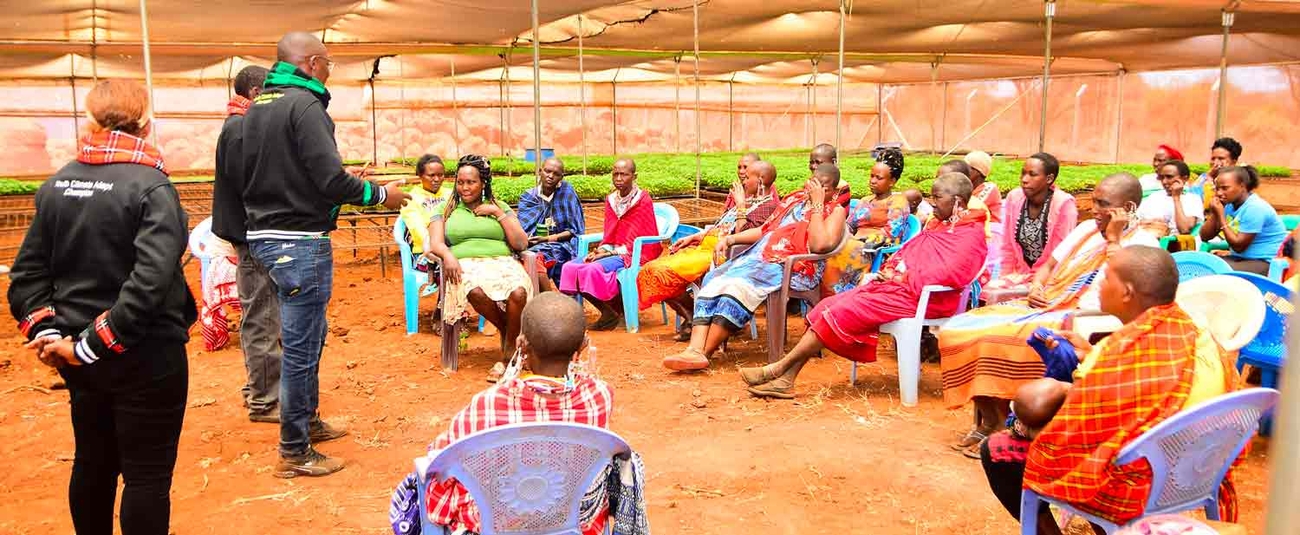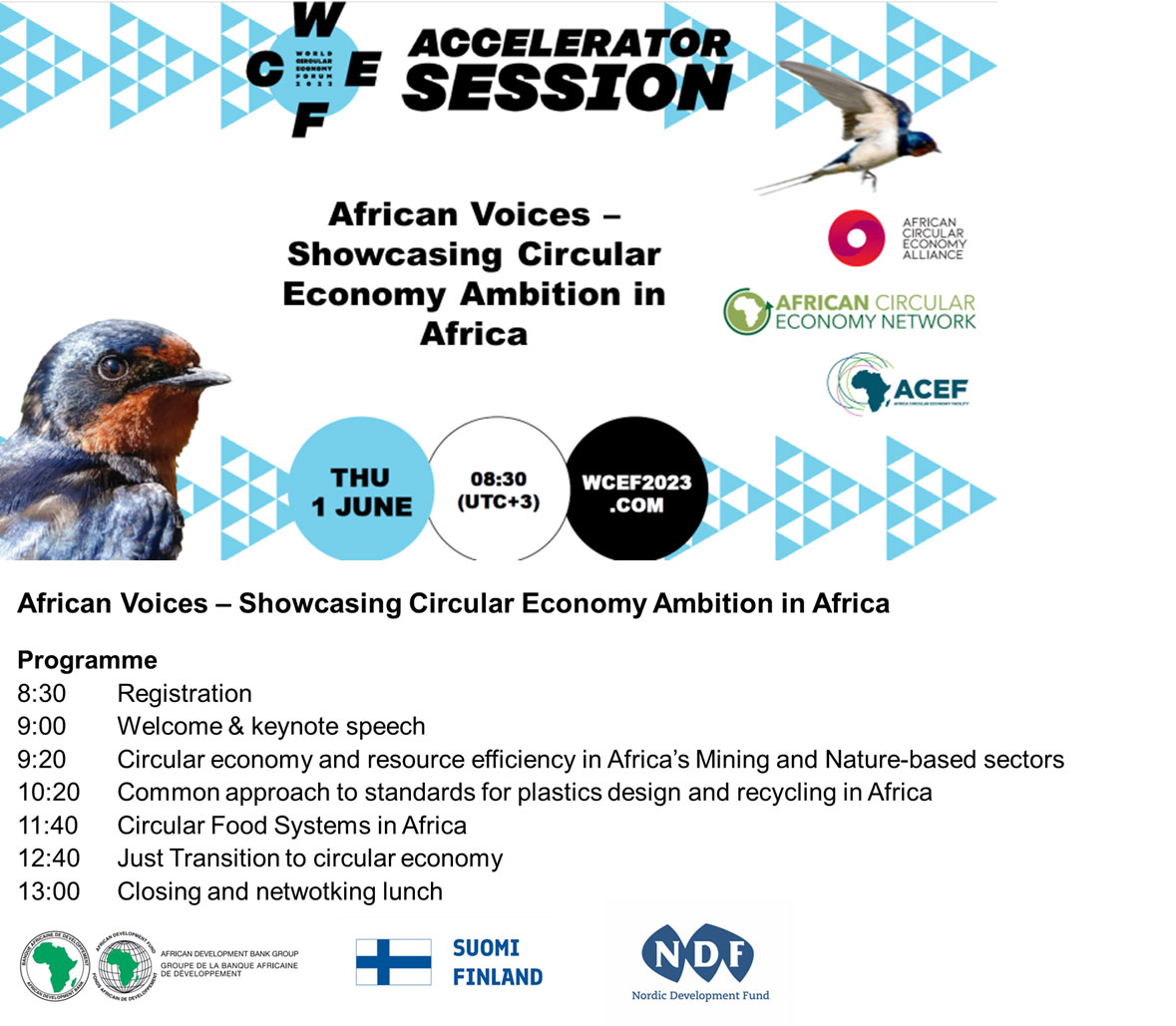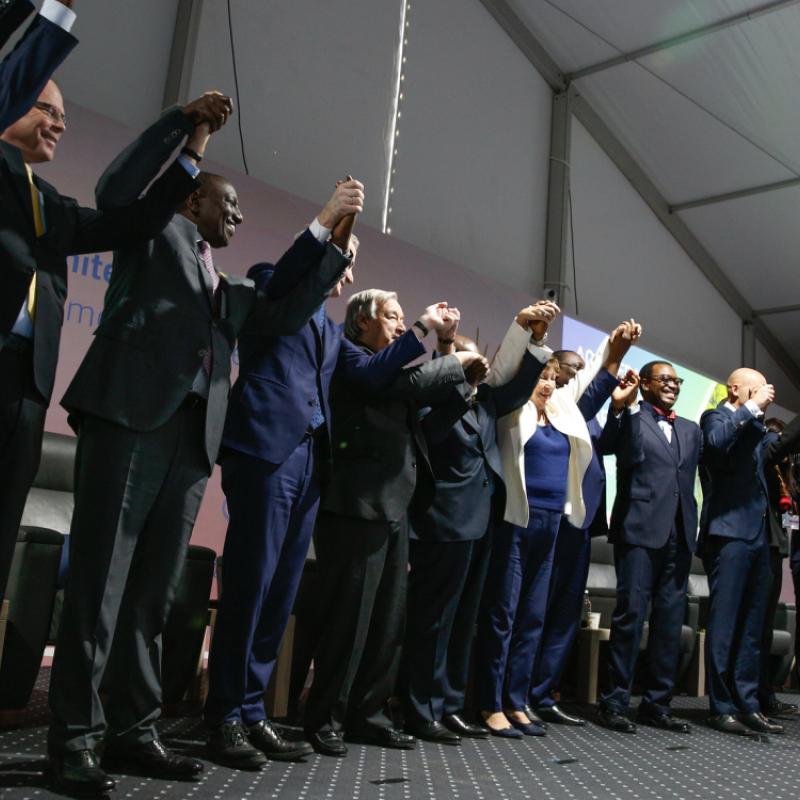
AAAP in the Media
Displaying 1 - 5 of 5
Millions pledged at Africa adaptation acceleration event
AAAP webinar: Innovation essential for climate-smart future, but it's not enough

The 2022 United Nations Climate Change Conference, COP27, is dubbed ‘African COP’ as the impact of climate change on African countries will be a key theme of discussions. Agriculture and food systems will also be a critical focus of COP27, with Saturday, 12 November, dedicated to both themes, in addition to adaptation. Also high on the climate agenda is the role of the youth, as 10 November is dedicated to their participation.
Ahead of COP27 and in line with their commitment to this youth agenda, the African Development Bank and the Global Center on Adaptation hosted a webinar to examine ways to make agriculture attractive to the youth.
The webinar titled, Are Climate-Smart and Digital Agriculture Solutions the Silver Bullet to Attract Youth, highlighted the potential of climate-smart and digital agriculture in attracting young people and thereby rejuvenating an aging global agricultural sector.
Dr. Kevin Kariuki, African Development Bank’s Vice President for Power Energy, Climate and Green Growth, pointed out the challenges the agriculture sector faces due to the changing climate change.
“Agriculture across most of sub-Saharan Africa is still predominantly rain-fed and therefore extremely vulnerable to both short-term fluctuations and long-term changes in climate conditions. It is the most exposed sector with estimates indicating that climate change will cause a decrease in yields of 8 – 22% for Africa’s rain-fed staple crops over the next 20 years,” Kariuki said.
Dr. Beth Dunford, African Development Bank’s Vice President for Agriculture, Human and Social Development, noted that while agriculture holds tremendous potential for job creation in Africa, its current traditional form is not attractive to young people for various reasons, including negative perceptions.
“Who wants to wear overalls, dig the field with a hoe or drive a tractor when we can do it in a suit and dust coat, right? However, technology makes agriculture cool enough to motivate them to use tech-enabled enterprises to be part of agricultural value chains,” Dunford said.
Prof. Anthony Nyong, Senior Director for Africa at the Global Centre on Adaptation, said: “There is a gap in the agriculture sector in Africa, and that is in the use of digital solutions.”
AAAP’s Climate Smart Digital Technologies for Agriculture and Food Security Pillar is scaling up access to digital technologies and associated data-driven agricultural and financial services for at least 30 million African farmers.
In the African Development Bank’s Program to Build Resilience for Food and Nutrition Security in the Horn of Africa (BREFONS), currently ongoing in Djibouti, Ethiopia, Kenya, Somalia, South Sudan, and Sudan, the AAAP is facilitating the integration of climate-smart digital technologies for adaptation and resilience.
“The project will increase the productivity of crops and livestock by 30%, reaching about 1.3 million farmers and pastoralists using climate services such as index insurance. About 55,000 additional jobs will be created for youth and women,” said Oluyede Ajayi, Africa Program Lead, Food Security and Rural Well Being, Global Centre on Adaptation.
Panelists said the youth must utilize their digital skills to accelerate the transformation of the agricultural sector, which forms the central pillar of Africa’s economy. They urged participants to contribute to solutions that enhance market linkages to promote agribusiness.
“Africa’s significant youth population faces rising unemployment with myriad negative consequences. These challenges are further exacerbated by climate shocks, skill gaps & limited preparedness to address the effects of climate change,” said Andre-Marie Taptue, Principal Economist at the African Development Bank's Jobs for Youth program.
AAAP’s YouthAdapt program promotes sustainable job creation through entrepreneurship in climate adaptation and resilience in Africa by unlocking $3 billion in credit for adaptation action.
Last year, the first set of ten young African entrepreneurs and Micro, Small, and Medium-sized Enterprises offering innovative solutions and business ideas that can drive climate change adaptation and resilience were awarded at COP26 in Glasgow. This year the Africa Youth Adaptation Competition 20 enterprises across Africa will each receive up to $100,000 in addition to mentorship and coaching to support their climate change adaptation innovation.
Panelists included Claude Migisha from the African Development Bank, Dr. Fleur Wouterse, and Aramide Abe from the Global Center of Adaptation. They shared their views on how AAAP was shaping and adding value to the Bank Digital Agriculture Flagship program, ways to accelerate investor engagement in agriculture adaptation, and how the YouthADAPT was moving the needle on entrepreneurship, unlocking finance and job creation.
Gislaine Matiedje Nkenmayi from Mumita Holdings, a recipient of the 2021 YouthADAPT Challenge award, shared her experience on how the $100,000 grant transformed her enterprise.
“With the grant, we were able to reach out to more than 10 cooperatives with a total of 257 smallholder farmers, to whom we offer free advisory services, low-cost greenhouses and solar-powered irrigation systems. We have been able to expand production from 100kg to 1000kg of fresh vegetables weekly,” Nkenmayi said.
In her concluding remarks, Edith Ofwona Adera, Principal Regional Climate Change Officer and AAAP coordinator at the Bank stressed the need to strengthen adaptation and resilience measures and expedite mainstreaming climate adaptation for transformation at scale. She called for the engagement of the private sector, given the role they can play in adapting to climate change, financing adaptation, and supporting others through products and services for resilience.
Building resilience for food and nutrition security in the Horn of Africa (BREFONS)
The target countries of this project (Djibouti, Ethiopia, Kenya, Somalia, South Sudan, and Sudan) are located in the arid and semi-arid lands, which comprise more than 70% of the Horn of Africa (HOA) region, receive less than 600 mm of annual rainfall and are characterized by recurrent droughts and unpredictable rainfall patterns.
Despite the region’s considerable range of natural resources, with their huge potential for wealth and progress, the HOA countries are struggling to cope with their worsening ecological circumstances. Droughts are increasing in severity and frequency and their impacts are exacerbated by advancing desertification, land degradation, global warming, and climate change. These circumstances have created chronic vulnerability in the HOA, with persistent food insecurity, widespread economic hardships, conflicts, and migration. The strategic priorities of countries in the HOA are defined by their urgent need to build resilience to environmental and socio-economic shocks, through investing in sustainable development and optimizing the productivity of their resources.
Through building resilience to climate change, the overall objective of this program is to increasing, on a sustainable and resilient basis, productivity and agro-sylvo-pastoral production in the HOA, increase incomes from agro-sylvo-pastoral value chains and enhance the adaptive capacity of the populations to prepare for and manage climate change risks.
- Provide upstream technical assistance to ensure climate smart digital technologies for adaptation and resilience are integrated into the project.
- Identifying key agriculture adaptation constraints that can be addressed by digital technologies and develop solutions
- Assessing the conditions and opportunities for digital applications for drought index insurance
- Identifying opportunities for digital agricultural adaptation solutions through the preparing of climate risk and digital agriculture profiles
- Supporting stakeholders to identify and implement opportunities through the preparation of a digital agricultural adaptation toolkit
- Building the capacity of policymakers and enable policy interventions to ensure uptake of digital solutions using the toolkit.
- Feasibility studies and assessment on building resilience for food security in Africa;
- Feasibility studies to assess integration of adaptation and mitigation measures for the sustainability of nutrition and food security interventions;
- Quality assurance and advisory services for results and evidence-based planning, management and M&E of the Youth Enterprise Development project interventions
The programme will contribute to improving living conditions, including for women and the youth; improving food and nutrition security; increasing resilience; and peace and security in the HOA. Specifically it will:
- Productivity (crops and livestock) increased by 30%
- 50% increase in digital literacy for actors across value chains, of which 80% are women and youth
- 30% de-risked credit as a result of use of Digital Climate Advisory Services and Digital Financial Services
- 30% increase in use of index insurance products by smallholders across target value chains
- 55,000 additional jobs created (primarily for women and youth)
- 1.3 million farmers and pastoralists in the six countries use climate services (e.g. index insurance with a gender focus), allowing them to benefit from:
- Increased productivity and agro-sylvo-pastoral production in the Horn of Africa, on a sustainable and resilient basis
- Increased incomes (by 40%) from agro-sylvo-pastoral value chains
- More broadly, the population of the Horn of Africa have enhanced adaptive capacity to better prepare for and manage climate change risks and variation.
USD 210 million
Skills for Employability, Inclusion and Productivity Project (SEIP)
The Somali youth experience low absorption in the formal job opportunities with over two-thirds of the unemployed spending at least 8 months searching for a job. As a result, the main form of employment in Somalia is self-employment in the informal sector. Over 64% of workers in Somalia, especially women and youth, are self-employed, 61% of whom are in non-agricultural self-employment. Given the low availability of decent jobs, the long job search period and the predominance of low wages and low productivity in the Somali labour market, the promotion of entrepreneurship and self-employment is a key strategy to improve employment outcomes and income generation. Therefore, skills development in areas that can enhance entrepreneurship is critical for risk management and for building resilience.
The Technical and Vocational Education and Training (TVET) in Somalia is very limited due to lack of adequate infrastructure and systems to implement the activities falling under the sector. The trainings are provided by private vocational training centers and by few public-training centers funded by the international community. As a result, TVET needs rehabilitation and be expanded in order to produce skilled workers and specialists who will eventually strengthen the Somali economy, which can then increasingly rely on their own domestic workforce.
The overall aim to increase access and relevance of technical and vocational skills that catalyse economic transformation and enhance employability and inclusion of Somalis, particularly for Youth and women. It will support the government to provide employable vocational and technical training opportunities targeting the youth. More specifically, the project will:
- Rehabilitate of technical and vocational training centers in order to increase access and ensure inclusion in skills training
- Build capacity of TVET teachers/instructors and improve TVET curriculum to strengthen skills quality and relevance
- Integrate entrepreneurship to enhance innovation and self-employment
- Support sectorial and institutional capacity building
a) Development of curriculum in climate sensitive courses
- Solar technology / solar system installation and maintenance
- Climate Smart agriculture including composite manure making, water harvesting, storage and application technologies, soil and water conservation.
- Eco-friendly construction skills
- Alternative livelihood skills such as plumbing and carpentry
b) Labour market assessment (including an assessment of potential for green jobs/ entrepreneurship in Somalia)
c) Entrepreneurship development in green enterprises
- 400 youth to be trained in climate-relevant and green related courses
- 120 young entrepreneurs to focus on green entrepreneurship/ jobs
- Reduced skilled labour shortages and labour importation
- strengthened technical and vocational skills development to enhance employability and contribute to inclusive green growth
- Increased access to quality skills development and enhanced equity in vocational training. through support to vocational and technical training and institutional capacity building
- Youth equipped with entrepreneurship skills necessary to facilitate self-employment, income generation and economic resilience
AfDB investment of USD 7.3 million
African Development Bank participates in the World Circular Economy Forum (WCEF)
What: African Development Bank participates in the World Circular Economy Forum (WCEF)
Who: African Development Bank, Nordic Innovation and the Finnish Innovation Fund Sitra, with international partners
When: 30 May - 2 June 2023
Where: Helsinki, Finland and online
A delegation led by African Development Bank Director of Climate Change and Green Growth Anthony Nyong, is at the 2023 World Circular Economy Forum (WCEF2023) in the Finnish capital Helsinki.
WCEF2023 is the seventh edition of the annual forum co-organised by Nordic Innovation and the Finnish Innovation Fund Sitra, with international partners, including the African Development Bank. The forum brings together business leaders, policymakers and experts from around the world to present the best circular economy solutions. WCEF examines how societies and businesses can seize new opportunities to accelerate the global transition towards a circular economy to achieve the UN Sustainable Development Goals. WCEF is the world’s best known neutral global circular economy event and platform for the global circularity movement.
To leverage and build on the results of last year’s WCEF and showcase circular economy ambition in Africa, a strong engagement of the African Development Bank is planned at WCEF2023. This includes speaker roles at plenary sessions, side events and hosting an African delegation of six participants from member countries of the African Circular Economy Alliance (ACEA) and African organisations to participate and speak at the event alongside the Bank’s mission team.
African Development Bank Director of Climate Change and Green Growth Anthony Nyong will participate in a guided dialogue during a session titled “Unlocking Finance for a circular and regenerative economy” organised by Circle Economy together with European Investment Bank (EIB). ACEA, whose secretariat is based at the African Development Bank’s headquarters in Abidjan, Côte d’Ivoire, will join in a session titled “Circular strategies and road maps,” organised by The Global Alliance on Circular Economy and Resource Efficiency.
The African Development Bank will host a stand at the WCEF Exhibition Area. This will give the opportunity to African Circular Economy Facility (ACEF), ACEA and its partners to showcase solutions to a global audience to attract partners and financiers for scaleup.
The Bank organises / has interventions in the following sessions:
TUESDAY, 30 MAY
Plenary Sessions at Helsinki Fair Centre
9:30-10:30
IFI CEN high-level working meeting
13:30 - 14:45
Unlocking finance for a circular and regenerative economy
THURSDAY, 1 JUNE
Accelerator Sessions, venues across Helsinki
8:30-13:00 (UTC+3)
Place: Messukeskus conference centre, Messuaukio 1, Helsinki and online
Accelerator session: African Voices to circular Economy
10:00 – 13:00
Accelerator session: International Financing and Funding for World Circular Economy Business Opportunities
16:00 – 17:30
Accelerator session: A circular economy that works for everyone: ensuring a just and jobs-rich transition to a sustainable future for all

Official WCEF2023 website: https://wcef2023.com/about/
Accelerator Session: https://wcef2023.com/sessions/african-voices-showcasing-circular-economy-ambition-in-africa/
Confirm your live attendance as soon as possible by registering through this link
Livestream on the WCEF2023 website and YouTube channel.
Media contact: Sonia Borrini, Communications and Knowledge Management Specialist, Climate Change and Green Growth Department | email : s.borrini@afdb.org
